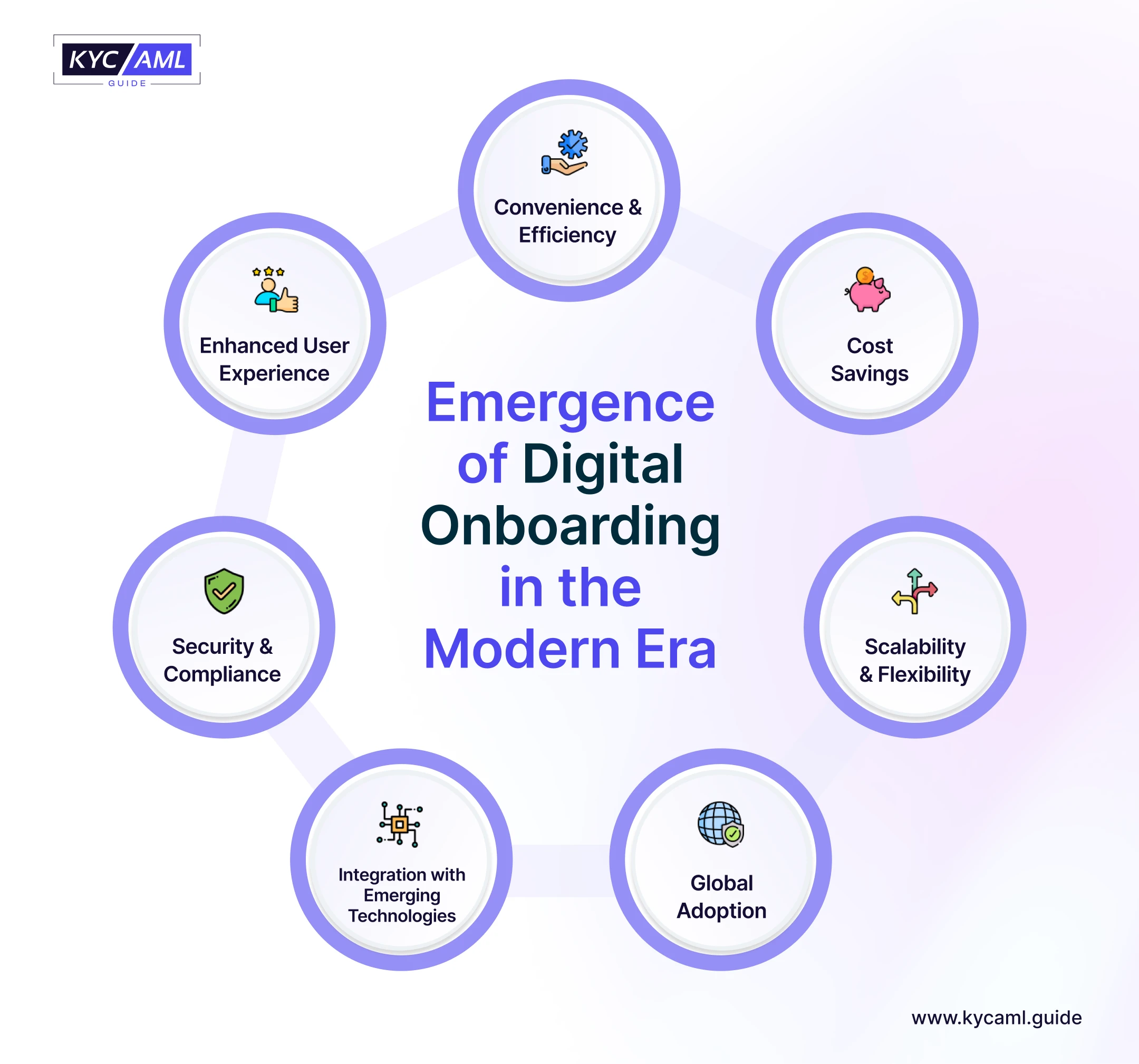The era in which customers submit physical documents and verification takes weeks and months is gone. Recently the traditional KYC process has been transformed due to digital solutions. Technological advancements like artificial intelligence, machine learning, and blockchain have made the process quicker and easier with digital KYC. Moreover, global expenditure on digital identity verification is projected to escalate from US$11.6 billion in 2022 to US$20.8 billion in 2027 with estimates suggesting that it could reach US$40 billion by 2032.
Emergence of Digital Onboarding
With the use of digital tools in business, the traditional paper onboarding process is replaced with new digital solutions. Companies are turning rapidly to digital onboarding platforms that simplify the process, from paperwork to background checks. The platform uses advanced technologies such as artificial intelligence (AI), machine learning, and automation to increase efficiency and accuracy. There are many benefits to going digital.
- First, it reduces the administrative burden on HR teams, allowing them to focus on other strategic initiatives.
- Second, it provides a seamless experience for new users, allowing them to complete the work at their own pace.

As the demand for flexible work arrangements increases, digital onboarding is becoming an important tool for organizations globally. The future of digital KYC onboarding is expected to grow exponentially due to technological advancements, changing regulatory environments, and changing customer expectations. Here are some trends and developments that could shape the future of digital KYC onboarding.
Automation in Onboarding Checks
One of the biggest trends in digital onboarding checks is the integration of automation. As organizations look for ways to simplify the onboarding process, automation is playing a critical role in transforming the traditional manual process into a streamlined process. Automated systems can perform many checks in a short amount of time, such as employment history checks, criminal background checks, and reference checks.
Artificial Intelligence
AI is revolutionizing the digital onboarding experience by providing instant assistance to new users. The AI-powered chat operators can answer frequently asked questions, guide users through the sign-up process, and even customize the experience based on individual preferences. Using AI algorithms, the systems can analyze large amounts of data to identify warning signs or anomalies. This not only saves time but also provides a more accurate and comprehensive research process. The integration of artificial intelligence is designed to identify points of failure, making it more efficient, user-friendly, and personalized for every user.
Biometric Verification
Biometric systems will continue to play an important role in identity verification during KYC digital onboarding. We will likely see the rise of multimodal biometrics, which combines two or more biometric authentications, such as fingerprints and faces, to increase security.
Blockchain for Secure Identity Verification
Blockchain technology with its transparent ledger, can revolutionize the KYC onboarding process by creating secure identity records, transparent data sharing between organizations, and immutable ledger. This can reduce the risk of identity theft and data breaches.
Advanced Security Measures
In an era of increasing cyber threats and data breaches, organizations must prioritize the security and privacy of users’ sensitive information. Onboarding check often involves the collection and processing of personal data, which requires the implementation of strict security measures. To address these issues, the future of digital onboarding will see the introduction of advanced encryption, cloud-based security, and multi-factor authentication technologies. These steps ensure that user data is protected from unauthorized access and cyber threats.
Data Privacy
In addition to security, privacy laws such as the General Data Protection Regulation (GDPR) play an important role in shaping the future of KYC digital onboarding. Organizations must follow strict guidelines for collecting, securing, and using user data. By implementing privacy-focused practices, companies can build trust among their employees and maintain regulatory compliance.
Personalized Onboarding for Employees
The future of KYC digital onboarding is not just about streamlining the process and increasing efficiency; it’s also about creating personalized, user-driven experiences. Organizations understand the importance of warmly welcoming new employees and integrating them into the company culture. Personalization can be done using data analytics and artificial intelligence algorithms. By analyzing data from past onboarding experiences, teams can identify patterns and preferences, allowing them to tailor the onboarding journey to individual needs. This includes personalized onboarding plans, training modules, and coaching programs.
Furthermore, employee-centric onboarding is more than the initial onboarding process. This includes ongoing support, a feedback system, and opportunities for growth and development. By supporting the well-being and success of new employees, organizations can increase engagement, retention, and overall productivity.
Getting Your Organization Ready for the Future of KYC Digital Onboarding
To keep up with the rapid changes in the KYC industry, organizations must focus on flexibility and agility in their identity verification strategies. Choose a KYC solution that can grow and adapt to changing standards and technology. This includes considering a cloud-based platform that offers regular updates and scalability. Ensure your team is fully up to date on the latest KYC processes and technologies. Ongoing training can help you make informed decisions about implementing a KYC system. As part of their KYC strategy, companies must adopt the principle of ‘data protection by design’ to ensure compliance with data protection regulations.
KYC AML guide can provide expert consultancy in choosing the best solution to streamline the onboarding process and mitigate fraud and money laundering.





